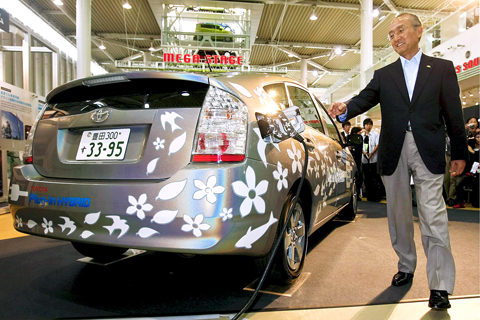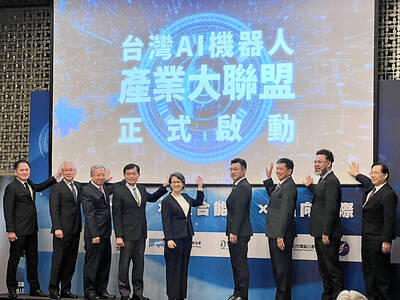Toyota is introducing a plug-in hybrid with next-generation lithium-ion batteries in Japan, the US and Europe by 2010, under a widespread environmental strategy outlined yesterday.
The ecological gas-electric vehicles, which can be recharged from a home electrical outlet, will target leasing customers, Toyota Motor Corp said.
Such plug-in hybrids can run longer as an electric vehicle than regular hybrids and are substantially cleaner.

PHOTO: EPA
Lithium-ion batteries, now common in laptops, produce more power and are smaller than nickel-metal hydride batteries used in hybrids now.
The joint venture that Toyota set up with Matsushita Electric Industrial Co, which manufactures Panasonic products, will begin producing lithium-ion batteries next year and move into full-scale production in 2010, Toyota said.
Toyota also said it would be setting up a battery research department later this month to develop an innovative battery that can outperform even that lithium-ion battery.
Japan’s top automaker, which leads the industry in gas-electric hybrids, has said it will rev up hybrid sales to 1 million a year sometime after 2010.
Hybrid vehicles reduce the pollution and emissions that are linked to global warming by switching between a gas engine and an electric motor to deliver better mileage than comparable standard cars.
Their popularity has been growing amid soaring oil prices and worries about global warming.
“Without focusing on measures to address global warming and energy issues, there can be no future for our auto business,” Toyota president Katsuaki Watanabe told reporters at a Tokyo hall yesterday.
He said that developing breakthrough technology would be critical to allow Toyota and other automakers to continue to grow while avoiding damage to the environment.
The Prius, which has been on sale for more than a decade, recently reached cumulative sales of 1 million vehicles.
When including other Toyota hybrids, the company said it sold 1.5 million hybrids so far around the world.
Toyota said that it is also working on the development of fuel-cell vehicles, which produce no pollution by running on the energy produced when hydrogen combines with oxygen in the air to produce water.
It is also improving mileage of all its models, including gasoline engine and clean diesel vehicles, it said.
It plans to set up more environmentally friendly factories that will produce fewer carbon gas emissions and develop production techniques that require less energy, using solar energy and planting trees, Watanabe said.
On Tuesday, Toyota said it would start making the Camry hybrid in Australia and Thailand as part of its efforts to step up production of “green” cars around the world.
The two plants were only Toyota’s second and third overseas production point for the Camry hybrid after its Kentucky plant in the US.
Aside from Japan, the only other country where Toyota manufactures its hybrids is China.
Toyota, close to overtaking General Motors Corp of the US as the world’s No. 1 automaker, faces competition from rivals, which are also all working on ecological technology.
For 2010, General Motors is planning a Chevrolet Volt plug-in electric vehicle, while Nissan Motor Co is planning electric vehicles for the US and Japan.
Honda Motor Co is also developing new hybrid models, targeting sales of 500,000 hybrids a year sometime after 2010.

The paramount chief of a volcanic island in Vanuatu yesterday said that he was “very impressed” by a UN court’s declaration that countries must tackle climate change. Vanuatu spearheaded the legal case at the International Court of Justice in The Hague, Netherlands, which on Wednesday ruled that countries have a duty to protect against the threat of a warming planet. “I’m very impressed,” George Bumseng, the top chief of the Pacific archipelago’s island of Ambrym, told reporters in the capital, Port Vila. “We have been waiting for this decision for a long time because we have been victims of this climate change for

MASSIVE LOSS: If the next recall votes also fail, it would signal that the administration of President William Lai would continue to face strong resistance within the legislature The results of recall votes yesterday dealt a blow to the Democratic Progressive Party’s (DPP) efforts to overturn the opposition-controlled legislature, as all 24 Chinese Nationalist Party (KMT) lawmakers survived the recall bids. Backed by President William Lai’s (賴清德) DPP, civic groups led the recall drive, seeking to remove 31 out of 39 KMT lawmakers from the 113-seat legislature, in which the KMT and the Taiwan People’s Party (TPP) together hold a majority with 62 seats, while the DPP holds 51 seats. The scale of the recall elections was unprecedented, with another seven KMT lawmakers facing similar votes on Aug. 23. For a

Taiwan must invest in artificial intelligence (AI) and robotics to keep abreast of the next technological leap toward automation, Vice President Hsiao Bi-khim (蕭美琴) said at the luanch ceremony of Taiwan AI and Robots Alliance yesterday. The world is on the cusp of a new industrial revolution centered on AI and robotics, which would likely lead to a thorough transformation of human society, she told an event marking the establishment of a national AI and robotics alliance in Taipei. The arrival of the next industrial revolution could be a matter of years, she said. The pace of automation in the global economy can

All 24 lawmakers of the main opposition Chinese Nationalists Party (KMT) on Saturday survived historical nationwide recall elections, ensuring that the KMT along with Taiwan People’s Party (TPP) lawmakers will maintain opposition control of the legislature. Recall votes against all 24 KMT lawmakers as well as Hsinchu Mayor Ann Kao (高虹安) and KMT legislative caucus whip Fu Kun-chi (傅崐萁) failed to pass, according to Central Election Commission (CEC) figures. In only six of the 24 recall votes did the ballots cast in favor of the recall even meet the threshold of 25 percent of eligible voters needed for the recall to pass,